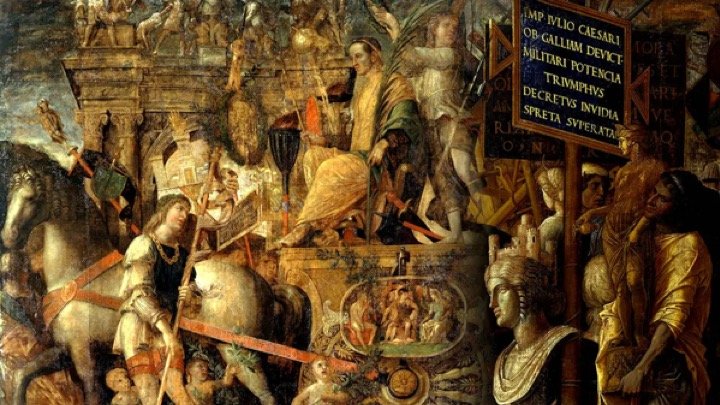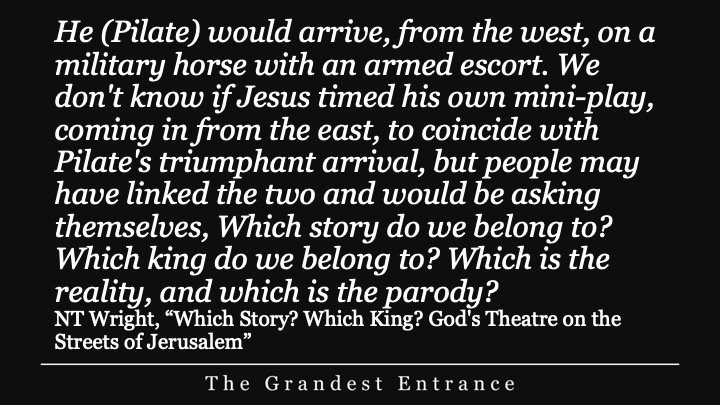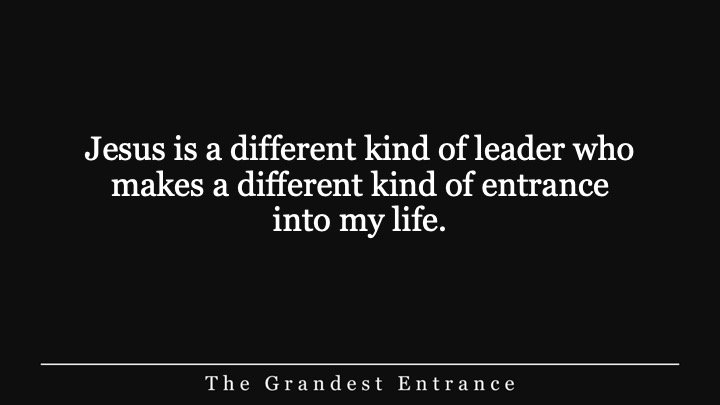The Grandest Entrance
Yesterday, I was privileged to preach at Cape Coral First Methodist Church where my friend Rini Hernandez is the Senior Pastor. Below is my Palm Sunday message. May it encourage you as you walk slowly with Jesus to the cross of Calvary and the empty Garden Tomb this Holy Week.
Jorge
Have I told you that Cheryl and I have four amazing grandkids? We indeed are blessed to have them living so close to us and so deeply engaged in our lives. About twice a week, our kids and grandkids come over to home. Now I have that “Find My” app on my phone so I can track them as they make the long (at least it seems long to Grandpa) 6-mile ride from their home to ours. I know, it’s kind of creepy, but I love our family. So, when they arrive, I’m often at the door with Cheryl to greet them.
I’ve noticed a pattern over the years that’s a bit troubling to me. I’ll open the door, throw open my arms and shout “Welcome” and one by one, my four grandkids will run past me into the arms of their “Lala,” my wife Cheryl. Then after a warm embrace of their grandmother, they slothfully welcome me with a limp hug. Can I remind you that entrances matter?
Military leaders know this as well as anyone. They know that entrances matter. Consider the conquests of the greatest military leaders in history. The way that they entered a city sent a strong message. Throughout human history, there have been military leaders who have made grand entrances into cities after a bloody conquest. The new ruler enters the defeated city in full regalia with his mighty army in tow. Sometimes their newly enslaved citizens file in behind the victorious warrior. It is a show of strength and power. Here’s a few examples from history:
Historians agree that in 331 BC, Alexander the Great defeated the Babylonian armies and then triumphantly entered the city of Babylon claiming it for the Macedonian Empire.
In 47 AD, Roman Caesar, Julius Caesar triumphantly entered the city of Zela following a swift battle is remembered in history through the classic phrase with which he described his victory: "Veni, vidi, vici," translated, “I came. I saw. I conquered.”
In 1806 AD, Napoleon Bonaparte, the French Emperor, paraded into and then proceeded to plunder the then Prussian city of Berlin.
Each of these leaders where showing their political and military power, most often through bloody wars, leaving a wake of defeated foes. You can add to their list ruthless military leaders like Adolf Hitler and dare I say, Vladimir Putin.
Well, today we are going to consider a different kind of grand entrance, Jesus’ Palm Sunday entrance into Jerusalem. Now remember with me the context. Throughout Mark’s biography of Jesus, he has been consistently trying to convince the first century readers of his life and ministry of Jesus that Jesus is the “Good News” and that indeed, Jesus is “the Messiah, the Son of God” (1:1).
Also, throughout Mark’s Gospel, the tension between Jesus and the religious leaders has grown. From trying to “trick him” and discredit him early in Mark, they are now trying to “kill him” and get rid of him later in Mark. To do this, the religious leaders must do the unthinkable. They must cozy up with the hated Romans. Now remember that Israel was living under the thumb of Roman Empire that demanded they affirm that “Caesar is Lord.” They hated Jesus so much that they would be willing to “go to bed” with the enemy to get rid of Jesus. This is how much power they saw that this homeless, itinerating Rabbi had. The religious leaders did not have the authority to have someone killed. For that, they needed Roman permission.
Now through all of this, Jesus has been clear. Three times in Mark’s Gospel, He has predicted what would happen to him. Let me remind you what Jesus had said to his apprentices three times in Mark. In Mark 8:31 (NIV), Mark writes: He then began to teach them that the Son of Man must suffer many things and be rejected by the elders, the chief priests and the teachers of the law, and that he must be killed and after three days rise again. Mark 8:31 (NIV)
Then in Mark 9:31b (NIV), Jesus himself says: He said to them, “The Son of Man is going to be delivered into the hands of men. They will kill him, and after three days he will rise.” Mark 9:31b (NIV)
And one last time, Jesus gives more chilling details on his impending death with these chilling words: Again he took the Twelve aside and told them what was going to happen to him. “We are going up to Jerusalem,” he said, “and the Son of Man will be delivered over to the chief priests and the teachers of the law. They will condemn him to death and will hand him over to the Gentiles, who will mock him and spit on him, flog him and kill him. Three days later he will rise.” Mark 10:32b-34 (NIV)
Jesus was clear about his mission. Jesus was not just a healer and a teacher. He was a Redeemer and a Rescuer. And this meant suffering and death, but it also meant resurrection. In each of Jesus’ predictions, he declares that after three days, he would rise.
With all this in mind, Jesus and his disciples make their way into Jerusalem for one last time in Mark’s biography. I’d like for us to go “old school” again and if you are able, would you stand as we read the Gospel, the Good News of Jesus, the Son of God from Mark 11:1-11 (NIV)? As they approached Jerusalem and came to Bethphage and Bethany at the Mount of Olives, Jesus sent two of his disciples, saying to them, “Go to the village ahead of you, and just as you enter it, you will find a colt tied there, which no one has ever ridden. Untie it and bring it here. If anyone asks you, ‘Why are you doing this?’ say, ‘The Lord needs it and will send it back here shortly.’ ” They went and found a colt outside in the street, tied at a doorway. As they untied it, some people standing there asked, “What are you doing, untying that colt?” They answered as Jesus had told them to, and the people let them go. When they brought the colt to Jesus and threw their cloaks over it, he sat on it. Many people spread their cloaks on the road, while others spread branches they had cut in the fields. Those who went ahead and those who followed shouted, “Hosanna!” “Blessed is he who comes in the name of the Lord!” “Blessed is the coming kingdom of our father David!” “Hosanna in the highest heaven!” Jesus entered Jerusalem and went into the temple courts. He looked around at everything, but since it was already late, he went out to Bethany with the Twelve. Mark 11:1-11 (NIV) This my friends is the Good News and this is Jesus’ grand entrance! Amen? Amen! You may be seated.
Bethany was about 2 miles outside of Jerusalem. Now remember this is Passover time. Many of the pilgrims who travel to Jerusalem for this required festival would have traveled by foot to the place where God had promised to meet with his people, the Temple. If for example, you lived in Jericho, it’s only about 15 miles, but here’s the deal. Jericho is the lowest city on the planet at 800 feet below sea level and Jerusalem sits at 3000 feet above sea level. The walk was arduous through hot, dry desert. So, you can imagine the delight worshippers had as they made their way to the mountains that surround Jerusalem and could not only see the first signs of vegetation but the beautiful city of David, Jerusalem.
Now imagine a huge family reunion with days of celebration, food, drink and dancing. This sounds like a Cuban party Pastor Rini! Family and friends from far away are gathering to remember the freedom that God brought his people, the Jews when he freed them from captivity in Egypt. The days of worship together are hopeful as they anticipate when once again, they will be free but this time not from Pharaoh and Egypt but from Caesar and Rome. Much like their climb to Jerusalem, their climb to freedom would be arduous too. You can see why they wanted a Messiah made in their image to free them.
This is the spiritual and emotional backdrop against which Jesus enters Jerusalem. Jesus is ready to make his “grand entrance” as a different kind of conquering king. So, how would he come? Matthew, Mark and Luke, the 3 Gospel narratives known as the “Synoptic Gospels” agree. He rides in on a colt. In Matthew’s biography, he tells us it was specifically a donkey. Jesus comes as a different kind of leader. His “grand entrance” is anything but grand. It is humble and lowly.
Some historians have speculated that on the other side of Jerusalem another parade was ensuing about the same time. Pontius Pilate, the Roman Governor, lived in Caesarea-by-the-Sea some 70 miles from Jerusalem. Caesarea would have a Temple to the Roman Caesar and god, Emperor Augustus. Because it was the Jewish Festival, Passover, Pilate would come to Jerusalem to oversee any potential; trouble that might brew because of the many Jewish pilgrims. N.T. Wrights comments: He (Pilate) would arrive, from the west, on a military horse with an armed escort. We don't know if Jesus timed his own mini-play, coming in from the east, to coincide with Pilate's triumphant arrival, but people may have linked the two and would be asking themselves, Which story do we belong to? Which king do we belong to? Which is the reality, and which is the parody? NT Wright, “Which Story? Which King? God's Theatre on the Streets of Jerusalem” This is quite a stark contrast to Jesus on a donkey.
And what are we to do with Mark’s recounting that spread their cloak’s before Jesus as he rode the colt? History tells us that this was an act not done for ordinary people or even special people. You would not lay your cloak down even for a friend or a respected elder. This was an act done exclusively for royalty. And the cutting down of palm branches and waving them was not done for anyone except a King. What we have here is a clash of 2 realities. Jesus was King. At least his disciples and it appears many in the crowd believed it. There cloaks and branches reveal that, but he was a very different kind of leader. Jesus’ “grand entrance” into Jerusalem was in that moment his royal reception.
And it wasn’t just what they did (laying down their cloaks and cutting and waving branches) that verified this. It was what they said. The crowds shouted “Hosanna.” Hosanna is Hebrew word that is a mixture of praise and prayer. It means to exalt God while at the same time ask to immediately save his people. But look with me at everything Mark records the crowds shouting: Those who went ahead and those who followed shouted, “Hosanna!” “Blessed is he who comes in the name of the Lord!” “Blessed is the coming kingdom of our father David!” “Hosanna in the highest heaven!” Mark 11:9-10 (NIV)
After the praise/prayer “Hosanna,” the crowd adds a quote from the worship book of the Bible, Psalm 118. The first sentence, “Blessed is he who comes in the name of the Lord” is pretty tame. It basically meant “Welcome.” They were welcoming Jesus to Jerusalem. It’s the second sentence that gets spicy. “Blessed is the coming kingdom of our father David!” This was a dangerous greeting. For those in the crowd wanting to fight the Roman’s, this was saying that Jesus is the Leader who is going to overthrow them. This part of the crowds chant was inciting and would have enraged the Romans. You can see the mixed motives of the crowds in this “grand entrance” of Jesus. And you can see the setting for both the religious leaders of Jerusalem and the governmental leaders of Rome colluding together to kill Jesus. Through it all, as Jesus has demonstrated and declared all along, he is a different kind of Messiah.
So, what do we learn from this story of Jesus’ “grand entrance?” Here’s what I’d suggest. Read this with me. Jesus is a different kind of leader who makes a different kind of entrance into my life. Repeat that again please. “Jesus is a different kind of leader who makes a different kind of entrance into my life.” If Palm Sunday screams anything, it screams that Jesus wants to be the Leader of our lives and his entrance into our lives is radically different.
One of my most favorite Bible verses are words from the lips of Jesus. In Matthew 11:28-30 (NIV) Jesus says: “Come to me, all you who are weary and burdened, and I will give you rest. Take my yoke upon you and learn from me, for I am gentle and humble in heart, and you will find rest for your souls. For my yoke is easy and my burden is light.” Matthew 11:28-30 (NIV) The invitation that Jesus makes for you and me to allow him to be the Leader of our lives is a gentle and humble invitation. Jesus says of himself “…for I am gentle and humble of heart.” Jesus will not bully his way into your life. He will simply knock at the door of your life and ask if you want him to come in and abide with you.
The night I began my journey with Jesus as a senior in high school, I came to Jesus on a wager. “Jesus, can you give my life purpose and meaning?” And Jesus gently and humbly entered my life. He did not come to conquer or defeat my life. He came into my life to fulfill it, complete and heal it. My life was lost in addictions, generational sin and emotional bankruptcy yet Jesus gently took me by the hand and said, “Come to me Jorge. I know that you are weary and burdened. I want to give you my rest. I want you to learn how live a new kind of life from me.” Jesus wants to do that for you too my friend.
Much of this message was inspired by an article I discovered by Dr. Jun A. Yarnes called “Histories ‘Grandest Entrance.’” I cannot say it any better than he does. Listen carefully to his wisdom. After each paragraph, I’ll ask a question for you to reflect on this morning.
Every grand entrance by a conqueror into a vanquished city was followed by a coronation. The new subjects would put emerald and gold encrusted crowns onto the heads of the conquerors, signaling their recognition as kings and emperors. Jesus was crowned, too. There were no jewels in the crown, however. It only had thorns.
How are you doing at crowning Jesus as the Leader of your life?
(Time for reflection)
Every grand entrance into a vanquished city meant expanded geographical territory for the empire of the conquerors. Jesus conquered no territory. Instead, He conquered hearts - the core of man's being and the seat of his will.
How are you doing at allowing Jesus to conquer new territory in your life?
(Time for reflection)
Vanquished people became the serfs and servants of those who conquered them. Jesus, however, made it clear that such was not the purpose of his conquest. "For even the Son of Man did not come to be served but to serve," he declared.
How are you doing at serving others for Jesus?
(Time for reflection)
With each grand entrance into a vanquished city, the conqueror would further his claim to immortality. The bowed heads of the conquered people fanned fantasies that the conqueror was to live forever. In stark contrast, Jesus made the grand entrance to Jerusalem not to claim immortality, but to die.
How are you doing at denying yourself, taking up your cross and following Jesus?
(Time for reflection)
When history's greatest conquerors made their grand entrances into vanquished territories, such entrances meant slavery - bondage for those who were conquered. Jesus was different. Those whose hearts he conquered are instead liberated from their bondage. They become free men.
How are you doing at living liberated from sin, self and Satan?
(Time for reflection)
Friends, Jesus is a different kind of leader who makes a different kind of entrance into my life. Let’s stand for prayer…
This message was profoundly influenced by Dr. Jun A. Yarnes’ article “Histories ‘Grandest Entrance.’” https://www.thefreelibrary.com/History%27s+%27grandest+entrance%27.-a0587255626




